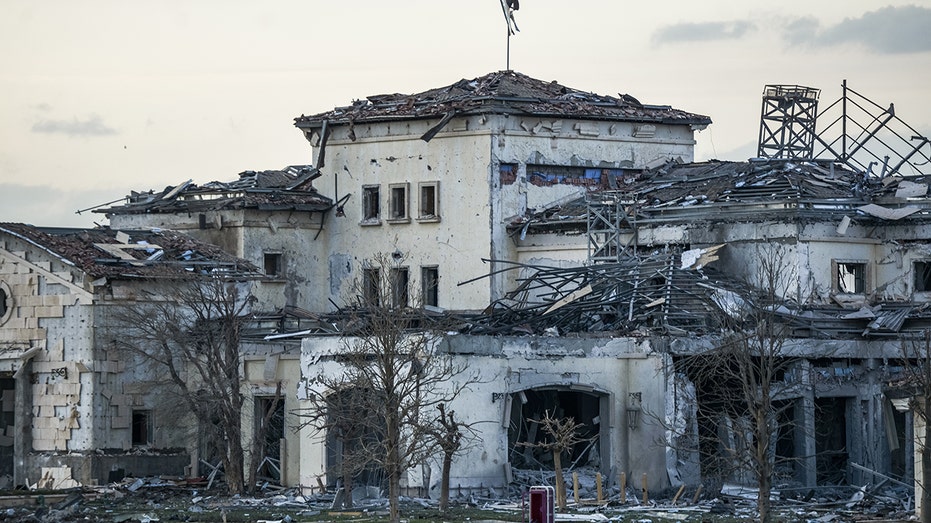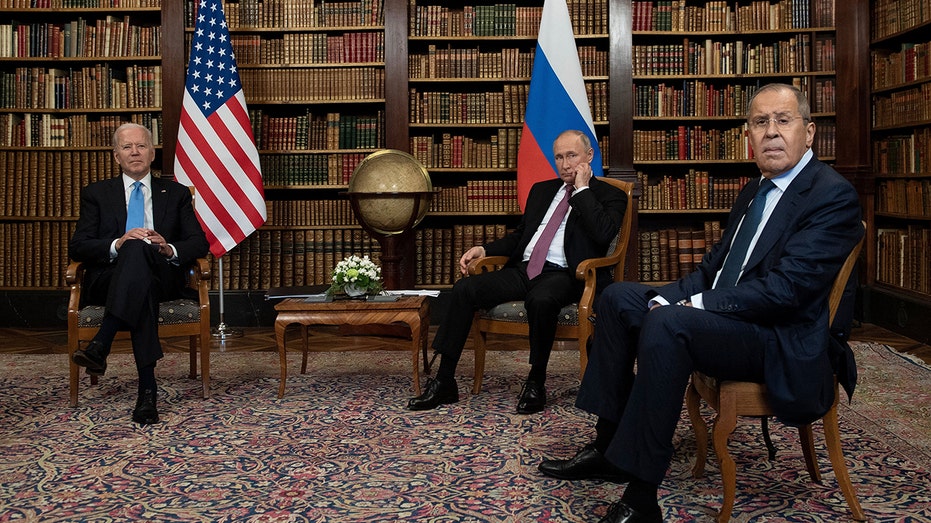U.S. won’t negotiate Ukraine-related sanctions with Russia to save Iran nuclear deal
A senior U.S. official called Russia’s demands 'the most serious stumbling block and obstacle to reaching a deal'
Putin will level Ukraine to claim victory: KT McFarland
Former deputy national security adviser and House Foreign Affairs Committee member Claudia Tenney discuss how Russia is impacting the Iran nuclear deal on 'The Evening Edit.'
The U.S. won’t negotiate exemptions to Ukraine-related sanctions on Russia to save the 2015 Iran nuclear deal and could try to strike a separate accord excluding Moscow, a senior U.S. official said, a diplomatic effort complicated by an Iranian missile attack on Iraq that sent American troops rushing for shelter.
With one of President Biden’s top foreign-policy goals imperiled, the U.S. official said Washington would start exploring alternatives to the deal over the next week if Russia didn’t back away from its demands for written guarantees exempting Russia from Ukraine-related sanctions that could curtail its future trade with Iran. Such guarantees could undercut the West’s punishing array of sanctions leveled at Russia over the Ukraine invasion.
"I don’t see the scope for going beyond what is within the confines of the JCPOA," the U.S. official said, referring to the 2015 nuclear deal formally known as the Joint Comprehensive Plan of Action. "I think it’s pretty safe to say that there is no room for making exemptions beyond those."
RUSSIA ASKED CHINA FOR HELP AHEAD OF US MEETING, ZELENSKYY WANTS TALKS WITH PUTIN: LIVE UPDATES
Meanwhile, Iran’s top paramilitary force took responsibility for a missile attack early Sunday on what it claimed were Israeli targets. It said the strike was in response to recent Israeli actions in the region, which included an airstrike last week in Syria that killed two of the group’s commanders.
The Iranian attack is likely to create more regional resistance to American efforts to strike a new nuclear containment deal with Iran. The U.S. effort to resurrect the deal with Iran, which then-President Donald Trump withdrew from in 2018, has drawn criticism from Israeli and Persian Gulf leaders who worry that it will allow Tehran to continue to arm allies across the region and carry out its own missile strikes with impunity.

ERBIL, IRAQ - MARCH 13: A view of damaged mansion reportedly belonging to the businessman Baz Karim after a dozen ballistic missiles hit northern Iraqâs Erbil on March 13, 2022. (Photo by Ahsan Mohammed Ahmed Ahmed/Anadolu Agency via Getty Images / Getty Images)
American, Iraqi and other world leaders condemned Sunday’s missile strike as a destabilizing act, as the Israeli military stepped up its defenses and U.S. officials considered how to respond. The French foreign ministry warned that the strike could imperil talks over the nuclear deal.
U.S. Deputy Secretary of State Wendy Sherman said U.S. officials are still seeking an agreement to curb Iran’s nuclear program despite the Iranian missile strike in Iraq.
"If Iran has a nuclear weapon, its ability to project power into the Middle East and to deter us, our allies, and partners, is enormous," Ms. Sherman said on Fox News Sunday. "So President Biden believes very strongly, as does Secretary Blinken, as do I, that we need to make sure that Iran never obtains a nuclear weapon, and then we also need to deal with their malign behavior in the region."
Time is pressing. U.S. and European officials say that Iran’s nuclear work has expanded close to a point that the deal’s main benefit to the West—keeping Iran months away from amassing enough nuclear fuel for a nuclear weapon—would be impossible. Iran is currently just a few weeks from that so-called breakout point.
The senior U.S. official said an agreement between Iran and the U.S. was "within reach," saying only a few issues were holding up a deal when talks in Vienna were broken off Friday because of Russia’s demand. The official called Russia’s demands "the most serious stumbling block and obstacle to reaching a deal."
There was no comment from Iran or Russia.
European officials say Russia had promised to respond with its precise demands for guarantees in the next few days. They have also started to explore among themselves options for pursuing a deal without Russia, two diplomats said.
"We would know within a week whether or not Russia is prepared to back down," the U.S. official said.
Earlier this month, as Western diplomats were seeking to wrap up the talks, Russia requested guarantees that its work under the JCPOA would be exempted from Western sanctions over Ukraine. The U.S. had given sanctions waivers for the 2015 deal.

ANTALYA, TURKEY - MARCH 10: Russian Foreign Minister Sergey Lavrov holds a press conference after the meeting with Ukraine in Antalya on March 10, 2022, in Antalya, Turkey. (Photo by Rıza Özel/ dia images via Getty Images / Getty Images)
However after Russian Foreign Minister Sergei Lavrov told reporters Moscow wanted much broader guarantees, its chief negotiator in Vienna, Mikhail Ulyanov, presented a second paper to European negotiators on Tuesday seeking to protect all future trade and investment against Ukraine-related sanctions.
It couldn’t be determined whether Iran would be willing to negotiate an alternative deal without Russia, or whether China—which has grown closer to Russia—would participate.
Mr. Ulyanov on Friday said his country’s demands weren’t the only reason an agreement on reviving the nuclear deal hadn’t been reached. Since negotiations hadn’t concluded, it was his country’s right to raise its concerns, he said.
The U.S. push to salvage the deal also comes as the Biden administration is on the hunt for new oil supplies during the war in Ukraine, as it seeks to contain surging energy prices. Iran could supply up to a million barrels a day of new crude supplies eventually if sanctions are lifted.
GAS PRICES: CAN THE NATIONAL AVERAGE STAY UNDER $4 PER GALLON?
One option for the U.S. and its partners would be to create an interim deal that could freeze some of Iran’s activities and wind back aspects of its nuclear program in return for some level of sanctions relief from the U.S. Iran has always rejected the idea of an interim deal.
Another option would be to create what the senior U.S. official called a "replica of the JCPOA," without Russia, which would assign Moscow’s tasks in the agreement elsewhere.
"I do think we would be open to various alternatives. We are beginning to think about what those might be," the official said. "We…at this point wouldn’t rule anything out."
Further complicating any attempt to re-craft a deal with Iran: Tehran has refused to let its negotiators talk directly to the U.S. until Washington lifts its sanctions.
Any new deal would also trigger U.S. legislation giving Congress time for an in-depth review of the accord.
The negotiations in Vienna, which have dragged on for close to a year, aim to agree on the steps the U.S. and Iran would take to return into compliance with the nuclear deal. If Russia’s demands can be resolved, negotiators have said they could be back in Vienna within a few days to finish the talks.
A NUCLEAR DEAL WITH IRAN IS IMMENSELY HARMFUL TO AMERICAN INTERESTS: KUDLOW
Iran has avoided calling out Russia and has continued to blame the failure to complete the talks on Washington. However there have been hints of irritation from Iranian officials, who have said they wouldn’t let external factors get in the way of their interests.
The senior U.S. official declined to say whether an agreement would have been concluded by now without the Russian intervention. Among the issues still on the table is whether Iran’s Revolutionary Guards would have their Foreign Terrorist Organizations listing removed and what any conditions might be around that, Western diplomats say.
Sunday’s missile attack, which the Revolutionary Guards claimed, could make any immediate attempt to remove them from the FTO listing more politically explosive.
The missile strikes injured at least two people, blasted holes in nearby homes, and sent U.S. forces rushing for cover at the American military base in Erbil. At least one missile hit within about a mile of a new U.S. consulate under construction. Erbil is the capital of the semiautonomous Kurdish region in Iraq.

US President Joe Biden (L), Russian President Vladimir Putin (C) and Russian Foreign Minister Sergei Lavrov (R) pose for press prior to the US-Russia summit at the Villa La Grange, in Geneva on June 16, 2021. (Photo by BRENDAN SMIALOWSKI/AFP via Getty Images / Getty Images)
National security adviser Jake Sullivan said in a statement that the U.S. "condemns in the strongest terms Iran’s missile attack on the Kurdistan Region of Iraq. This attack targeted a civilian residence in Erbil, the Kurdistan Region’s capital city, without any justification." He added that the U.S. would stand with other allies in the Middle East "in confronting similar threats from Iran."
Iran claimed that it was targeting Israelis in the strike. Israel has strong relations with the Kurdish region, but Israeli officials declined to comment on reports that Sunday’s strike was aimed at Israeli spies working in northern Iraq.
GET FOX BUSINESS ON THE GO BY CLICKING HERE
Israel has been carrying out airstrikes against Iranian-backed militias and Iranian personnel in Syria as it seeks to prevent Iran from transferring weapons to Hezbollah, the Lebanese militia group. The campaign includes placing mines on ships carrying oil and other goods that are bound for Syria.
The Iranians, in turn, have often sought to pressure the U.S. to constrain its Israeli ally.
CLICK HERE TO READ MORE ON FOX BUSINESS
In October, Iran directed five drones at the al-Tanf garrison in southern Syria, which is defended by a small contingent of U.S. forces and American-trained Syrian fighters. The Iranians said in a confidential message to the U.S. at that time that the attack was in response to an Israeli airstrike that killed two Iranian officers in Syria, U.S. officials said.
In January, the massive U.S. Embassy complex in Baghdad was struck by four rocket attacks that injured at least two individuals but no U.S. personnel were hurt. That attack originated from inside Baghdad and was believed to have been carried out by an Iranian-backed militia group.




















